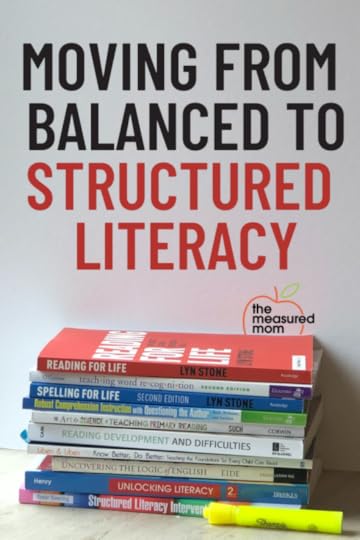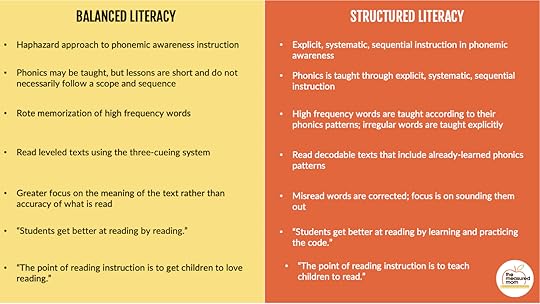Moving from balanced literacy to a more structured approach

I was a committed balanced literacy educator for 20 years.
To me, balanced literacy meant that I taught both basic skills and a love of reading.
I put a greater emphasis on the activities – shared reading, guided reading, independent reading, read aloud, and centers – than on foundational skills.
Sure, I taught phonics … but I didn’t want to overdo it. So I didn’t use a phonics program; I taught phonics on a need-to-know basis.
Instead of giving explicit instruction, I had my students read independently for long periods while I gave short one-on-one conferences.
I was passionate about balanced literacy.It’s the approach I learned in graduate school. It’s what I used to teach my first and second graders to read.
It’s the approach I used to teach my oldest five kids to read.
It’s what I thought other teachers should use (and I told them so through multiple blog posts and workshops).
I thought it worked (it sure seemed to).
It wasn’t until I read Emily Hanford’s viral article a few times that I started to wonder if I needed to rethink my approach.
I wish I could tell you that the first time I read the article, my eyes were opened. But I was stubborn, and it was more than a year before I took it to heart.
Check out this podcast episode
My reaction to Emily Hanford’s article, “At a Loss for Words”
The first thing I questioned was three-cueing …
Once I understood how the brain learns to read, I began to realize that three-cueing (having kids “guess” words using just the first letter, pictures, or context) was actually bypassing an important process called orthographic mapping.
This episode spells it out …
What’s wrong with three-cueing?
In other words … I wasn’t helping my students remember the words for the future.
And by my lack of explicit phonics instruction, I almost guaranteed that some of my students would hit a wall in later grades when they lacked strategies for reading multi-syllable words in books without pictures or helpful context.
As I studied structured literacy, I began to see the differences between what I’d been doing and what an approach backed by research looks like.
 I began to make quite a few changes …I stopped leaving phonemic awareness to chance.I started using decodable instead of leveled text.I created a systematic, sequential
phonics scope and sequence
… and actually used it.I integrated spelling with phonics instruction.I found a new way to teach “sight words.”I began to look at comprehension in a different way.For the first time, I saw the incredible value of explicit instruction.
I began to make quite a few changes …I stopped leaving phonemic awareness to chance.I started using decodable instead of leveled text.I created a systematic, sequential
phonics scope and sequence
… and actually used it.I integrated spelling with phonics instruction.I found a new way to teach “sight words.”I began to look at comprehension in a different way.For the first time, I saw the incredible value of explicit instruction.Check out this popular post
The ultimate guide to decodable books
And all along the way, I was encouraged that thousands of other teachers were making the switch!
In anticipation of the fall launch of our course, Teaching Every Reader, Becky Spence and I are beginning a collaborative blog series all about making the switch from balanced literacy to a more structured approach.
Just click on each image to find the blog post![image error]Coming August 29 Coming September 5 Coming September 12 Coming September 19 Coming September 26 Coming October 3
The post Moving from balanced literacy to a more structured approach appeared first on The Measured Mom.
Anna Geiger's Blog
- Anna Geiger's profile
- 1 follower



